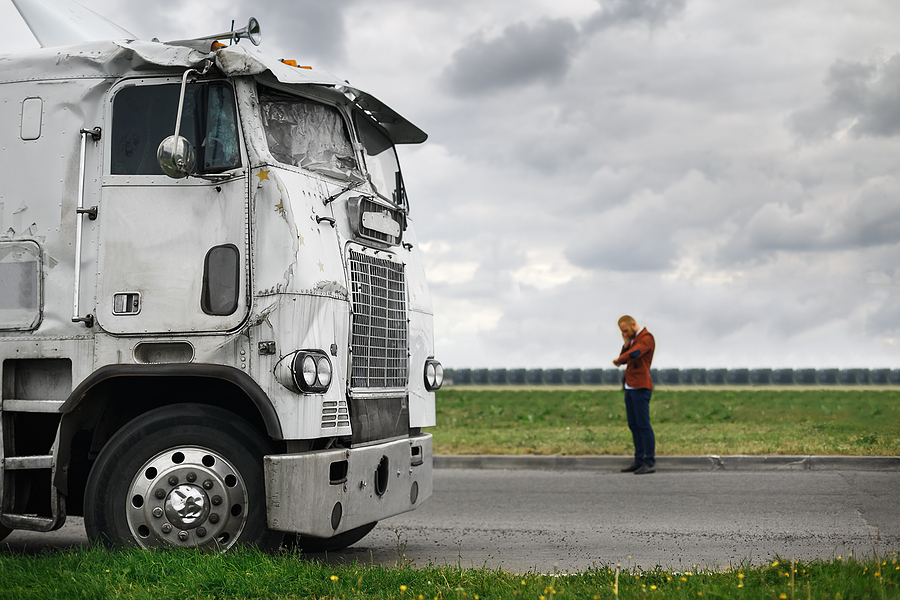
Here’s what to do after a truck accident.
Getting into an automobile accident is always an awful experience, especially if the collision involves a truck. Commercial truck engines alone can weigh as much as 3,000 pounds. That’s comparable to the weight of a standard car. After sustaining that kind of impact, thinking straight isn’t easy. This seven step guide will walk you through the basics of what to do if this unfortunate situation arises.
1. Gather Evidence of the Accident
Gather as much information as possible from the scene of the accident. Make note of the time and location. Take pictures that show the damage on all vehicles involved. Capture images of the license plates, the vehicle makes and models, and any logos showing the trucker’s employing company. Photos that show the conditions of the road are also important proof. For instance, take pictures of potholes, skidmarks, and signs of the weather at the time of the accident. Not all injuries will be visible. However, if there are physical signs of injury, take pictures of them at the scene and in the days that follow. Your personal injury attorney will utilize this evidence to establish the other party’s fault. By law, both the truck driver and you are required to exchange information. Ask for the driver’s name, birthdate, plate number, and license.
2. Talk to Witnesses
It seems like practically everything is caught on video in these modern times. In reality, many accidents happen where there are no surveillance cameras capturing the action. Witnesses can provide statements that are instrumental in showing who is responsible for a truck accident. Unlike the drivers, witnesses have nothing to gain or lose in the case. Their observations are more likely to be seen as neutral. Witnesses also see the events from a different perspective. There is a good chance they noticed factors that contributed to the collision that the occupants couldn’t have seen themselves. Start with an open-ended question about what happened. Then ask specific questions to fill in the missing details. A clear audio or video recording of their accounts will be more accurate and comprehensive than written notes. However, it doesn’t hurt to obtain both if possible.
3. Collect Contact Information for Witnesses
Your personal injury attorney will research and investigate to get further evidence, including documentation from the trucking company. You or your attorney may have important follow-up questions as investigations into the truck accident move forward. Collect the names and phone numbers of each witness you have spoken to. This includes the contact information of other drivers and passengers in any other vehicles involved.
4. Seek Medical Treatment for Injuries
It is vital to seek medical treatment as soon as possible. By Minnesota law, you have a duty to assist those who have been injured. That includes alerting law enforcement to get emergency medical responders to the scene. When you call 911, be sure to describe your injuries and the injuries of the other parties involved. However, you aren’t expected to take any actions that will put you in danger or cause you any harm. In the event of a truck accident, it is very possible that severe injuries could prevent you from being able to help.
Even if you aren’t initially in pain, see a doctor immediately after you leave the scene. Invisible, serious conditions like internal bleeding can be detected through diagnostic testing. It could save your life. In a personal injury case, seeking medical treatment also helps to show that you took measures to prevent further damage. Additionally, it demonstrates that your injuries came from the truck accident rather than a previous incident.
5. File a Claim with your Insurance Company
Minnesotans have six months after the date of an accident to make a no-fault claim with their own insurance companies. Proof of your medical expenses must be included in the claim. You can also include proof of non-medical expenses like lost wages and replacement services. Periodically submit these expenses as they are accrued throughout your treatment and recovery.
6. Don’t Sign Anything or Give a Statement to an Insurance Company
An insurance company’s top priority is making and keeping as much money as possible. That means they’ll take measures to delegitimize your claim. If given the opportunity, insurance companies will guide you into making statements that can damage your case. Anything you say to them can be used to reduce your claim’s value or dismiss it altogether. Minnesota is a one party consent state. That means conversations can be recorded with the permission of only one participant. It gives insurance companies a chance to box you into one rigid account of your accident. The companies can use this to try to disregard any future witness accounts or details you recall later when you’re not under pressure. Your attorney can communicate with the insurance company on your behalf and will bypass these types of deceptive practices.
7. Contact an Experienced Minnesota Truck Accident Attorney
If you or a loved one has been injured in a truck accident, speak to the attorneys of Sand Law. Our experienced lawyers are prepared to fight for the best compensation possible so that you can heal and get your life back on track. Contact us online, by chat, or by phone at 651-291-7263.

